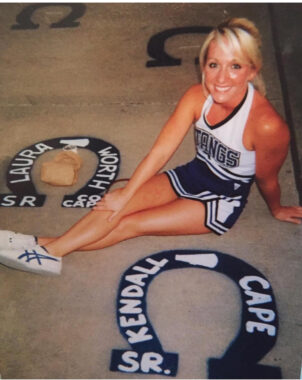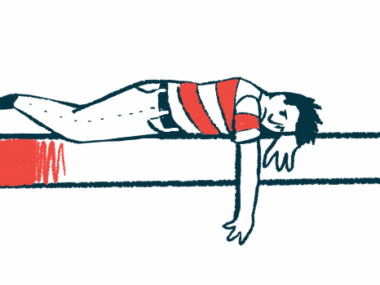Fighting battles with Friedreich’s ataxia ‘between my ears’
FA may have won the physical battle, but it won't win the war of my life
Written by |

Like many Americans, I recently got caught up in the Netflix docuseries “America’s Sweethearts: Dallas Cowboys Cheerleaders.” I love it for several reasons, but mostly because I’m from Texas and have a cheerleading background.
Before Friedreich’s ataxia (FA) forever changed my life when I was 25, in 2013, I was active. I participated in every sport available to me when I was a kid. Soccer, softball, swimming, dance, volleyball, track, and basketball: I did them all.
After I got married in 2009, sports remained a huge part of my life, as my husband and I played in coed softball, flag football, and sand volleyball leagues. But I still mainly identified as a swimmer and a cheerleader because I played those two sports the longest and most successfully.

Kendall Harvey as a cheerleader in 2006. (Courtesy of Kendall Harvey)
That history made it more emotionally devastating when FA made me physically disabled. I loved being active, graceful, healthy, competitive, outgoing, strong, energetic, and capable. FA has taken nearly all of that away from me. It’s a reality that I grapple with every minute.
Therefore, when I saw a mindless docuseries about cheerleading pop up on my Netflix welcome screen, I just knew I’d enjoy it. The series follows the cheerleaders’ auditions and training camp, as well as which of them made the 2023 Dallas Cowboys cheerleading squad. The women trying out are stunningly beautiful, hardworking, talented, and sweet. They’re easy to root for, hence the series title.
In one episode, Emmitt Smith, Dallas Cowboys Hall of Famer and the NFL’s all-time leading rusher, chats with the cheerleader hopefuls. He gives them advice I’ve heard many times throughout my life, especially from coaches and mentors. Smith talks about being mentally tough and how your mindset can affect everything. Then he says, “The battle is won between your ears.”
The war with FA
Now that FA has disabled my body, I don’t foresee the need to apply that wisdom to any athletic career. But Smith’s powerful advice transcends sports. Your perspective, attitude, mental resolve, and habits can have such an impact on your life.
I can’t be silly and do cannonball contests when I swim with my kids. I can’t make goofy, dancing TikTok videos with my friends on girls’ nights. I can’t do slip-and-slide base running during mother-son baseball games. FA has won that physical battle. So now it becomes a mental battle that takes place between my ears.
I’m sure that most of us are familiar with the common strategic saying “You may have lost the battle, but not the war.” The way I see it, FA has claimed victory over my physical battle, but the war of my life is ongoing. I’m still waging mental and emotional battles.
Some days, FA makes strategic advances. On other days, my mental fortitude and emotional resiliency do. I don’t plan on letting FA claim a total victory in my war. I plan to keep fighting for ways to cope with my physical losses, make positive memories, grow more emotionally flexible, strengthen my resolve, and just keep doing my best, all while relying on grace.
There’s no tried-and-true playbook for a lifelong battle with a progressively degenerative condition such as FA. But I agree that when you’re fighting a war against your body, which you can’t control, that “the battle is won between your ears.”
“May the God who gives endurance and encouragement give you the same attitude of mind …” — Romans 15:5 (New International Version)
Note: Friedreich’s Ataxia News is strictly a news and information website about the disease. It does not provide medical advice, diagnosis, or treatment. This content is not intended to be a substitute for professional medical advice, diagnosis, or treatment. Always seek the advice of your physician or another qualified health provider with any questions you may have regarding a medical condition. Never disregard professional medical advice or delay in seeking it because of something you have read on this website. The opinions expressed in this column are not those of Friedreich’s Ataxia News or its parent company, Bionews, and are intended to spark discussion about issues pertaining to Friedreich’s ataxia.






Douglas Walker
I have had FA since i was 27 yrs old ,late onset I was in the army,a signal corp radio rtty and voice aand crypo operatoralso used morse code ,I have beeen a ham operator talking world wide ,made qso with many people ,some very important,now i cant' send morse code any more can,t walk my speech is very hard to understand. I am now 84 yrs old soon to be 85 i hope.. just keep on keeping on. ------- Scott Walker